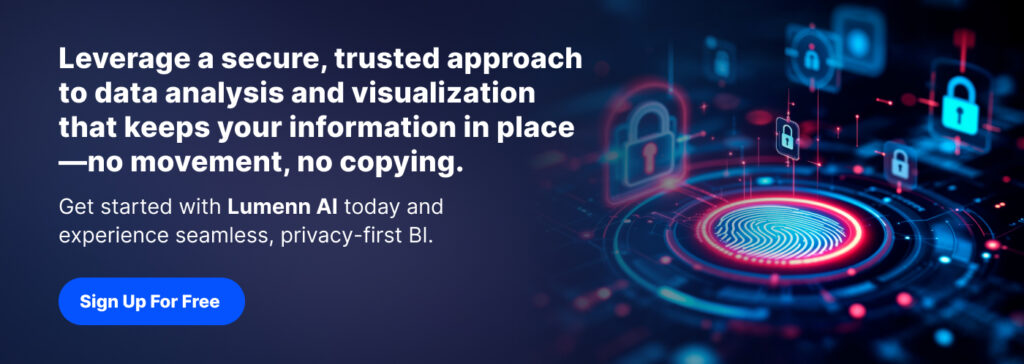The business intelligence (BI) landscape has undergone a significant transformation with the advent of no-code generative AI-driven platforms. These solutions empower organizations to derive actionable insights without needing extensive technical expertise. A new trend gaining momentum within this space focuses on enhancing cybersecurity by adopting platforms that do not store user data, offering a compelling mix of privacy, performance, and accessibility.
The Cybersecurity Challenges in Traditional BI Platforms
Traditional BI tools typically require significant data centralization, often demanding the storage and processing of sensitive business information on external servers. While cloud storage and processing offer scalability, they also present vulnerabilities:
- Data Breach Risks: Centralized data storage is an attractive target for hackers, increasing the risk of breaches.
- Regulatory Compliance: Organizations must adhere to stringent regulations like GDPR, HIPAA, or CCPA, complicating data management.
- Insider Threats: Even with external security measures, insider threats—whether intentional or accidental—pose a challenge.
- Third-Party Dependence: Outsourcing BI infrastructure can introduce dependencies and vulnerabilities through third-party integrations.
Given these challenges, businesses are increasingly looking for BI platforms that align with robust cybersecurity frameworks.
Advantages of No-Code Generative AI-Driven BI Platforms Without Data Storage
Platforms that do not store user data address these challenges by eliminating the need for sensitive information to reside on external servers. Here are the core cybersecurity advantages:
- Data Ownership and Privacy These platforms process data locally or in-memory without retaining it, ensuring that ownership remains entirely with the user. Sensitive information never leaves the organization’s environment, reducing the likelihood of exposure.
- Minimized Attack Surface By eliminating centralized storage, the attack surface for cybercriminals shrinks significantly. Hackers have no centralized database to target, thereby reducing the risk of mass data breaches.
- Compliance Simplification Compliance with privacy laws like GDPR becomes more straightforward since no personal or sensitive data is stored. Audits and reporting requirements are streamlined due to the lack of persistent data.
- No Insider Threats Related to Stored Data Without long-term data storage, the risk of insider threats—whether through malicious intent or accidental exposure—is mitigated.
- Enhanced Speed and Security In-memory or local data processing ensures real-time insights while maintaining control over sensitive information. By focusing on ephemeral data handling, these platforms enhance both performance and security.
Notable Tools Leading the Way
Several innovative BI tools leverage no-code generative AI while prioritizing cybersecurity and data privacy. Among them are:
1. Lumenn.ai
- Overview: Lumenn.ai is a cutting-edge no-code platform that combines generative AI capabilities with BI functionality. The platform enables users to create insightful dashboards and reports without storing any user data.
- Cybersecurity Focus: Data is processed in-memory and discarded after analysis, ensuring no data retention.
- Key Features: Easy-to-use interface, real-time analytics, and robust local processing that adheres to the highest privacy standards.
2. ThoughtSpot
- Overview: ThoughtSpot offers AI-driven BI solutions that emphasize secure, decentralized data processing.
- Cybersecurity Focus: Provides integration with local databases, allowing users to maintain control over their sensitive information.
- Key Features: Intuitive search-driven analytics powered by AI, enabling non-technical users to explore data.
3. Looker (Part of Google Cloud)
- Overview: Looker emphasizes integration and analysis of data within user environments without requiring unnecessary replication.
- Cybersecurity Focus: Works seamlessly with existing security protocols, ensuring that data remains within secure boundaries.
4. Tableau
- Overview: While Tableau traditionally operates as a centralized BI tool, its recent integrations offer users options to process data locally or in-memory.
- Cybersecurity Focus: Allows users to configure data storage and access controls to meet privacy needs.
Real-World Applications and Use Cases
- Healthcare Analytics Organizations can analyze patient data without storing sensitive medical records, ensuring HIPAA compliance. Generative AI-driven tools like Lumenn.ai can help in predictive analytics for patient outcomes while maintaining data privacy.
- Financial Sector Insights BI platforms that do not store data can be instrumental in generating real-time risk assessments without exposing sensitive customer or transaction information.
- Government and Defense In sectors where data confidentiality is paramount, platforms that avoid persistent storage are invaluable, enabling secure decision-making with zero data exposure.
- Retail and E-Commerce Businesses can leverage AI-driven BI for trend analysis and customer behavior prediction without risking breaches of consumer data.
The Future of Cybersecure BI
The combination of no-code accessibility, generative AI capabilities, and data privacy safeguards heralds a new era for BI platforms. By eliminating the need to store sensitive data, tools like Lumenn.ai empower businesses to focus on insights without compromising cybersecurity. As businesses grapple with escalating cyber threats and regulatory requirements, adopting such platforms is no longer a luxury—it’s a necessity. The evolution of cybersecurity-first BI tools ensures that organizations can remain agile, data-driven, and secure in an increasingly complex digital landscape. By leveraging solutions like some of the tools above and other no-code, non-data-storing platforms, businesses are not just safeguarding their present operations—they’re securing their future.

